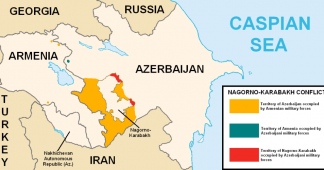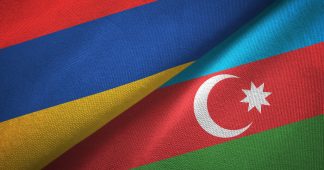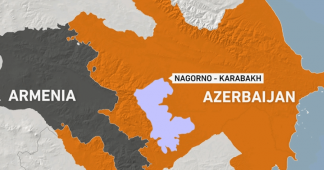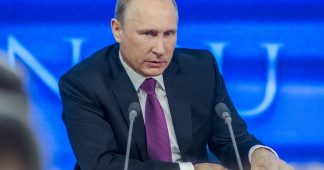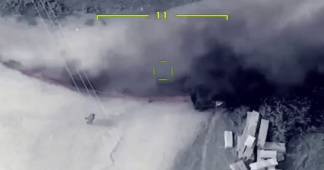November 17, 2020
Question: Mr President, a week has passed since the signing of a most important statement by Azerbaijan, Armenia and Russia. How do you assess the implementation now? What is successful? What might still be a problem? Most importantly, do you think this agreement will make it possible to sever the tight knot and resolve this very long-term and sensitive issue where each side has its own truth, as you put it yourself?
President of Russia Vladimir Putin: The most important achievement was stopping the bloodshed. I have already said that according to official figures alone, over 4,000 people have died. I think that in reality the figures are higher. Tens of thousands are wounded and mutilated. Look, this is not a movie. This is a tragedy that has befallen real people, real families. Therefore, stopping the bloodshed is the main result.
However, to understand what is happening we will still have to go back into history, literally in a few words. I have to recall that it all started in the already remote year of 1988, when ethnic clashes took place in the Azerbaijani city of Sumgayit. Armenian civilians fell victim to these events, and later it spread to Nagorno-Karabakh.
And since the Soviet Union’s leaders did not react duly to these events… let me say it again: these are sensitive issues, and I do not want to side with anyone or decide who was right or wrong. It is no longer possible to determine this now, but it was necessary to put things in order and protect civilians, and this was not done. At that point, the Armenians themselves took up arms, and this protracted conflict, a conflict building for many years, broke out. Eventually, it led to a declaration of independence, sovereignty and self-reliance by Karabakh in 1991. The Bishkek agreements were signed in 1994 and this Bishkek memorandum stopped the hostilities at that time.
What happened as a result? Karabakh declared independence, as I have said, and another seven adjacent regions came under the control of the Armenians, that is, Armenia.
This is basically what we inherited from the past and this is the problem we had to resolve.
I believe the fact that hostilities have stopped and, importantly, the parties agreed to unblock the roads and to restore economic ties is critically important and creates a good basis for normalising relations for the long term.
Remark: No one recognised Karabakh’s status back then, either.
Vladimir Putin: That is true: no one recognised it then or later. By the way, Armenia itself did not recognise it.
Question: Does the problem of Karabakh’s status still exist at all?
Vladimir Putin: Yes, there is this problem, since Karabakh’s final status has not been settled. We have agreed to maintain the status quo. What happens next will be decided eventually by the future leaders and the future participants in this process. I think if proper conditions are created for normal life and relations between Armenia and Azerbaijan, between people in everyday life, especially in the conflict zone, are restored, it will create an environment for determining Karabakh’s status.
With regard to recognising or not recognising Karabakh as an independent state, there may be different approaches, but this undoubtedly was a significant factor, including in the course of the bloody conflict that I hope has ended. Because the very fact of the non-recognition of Karabakh, including by Armenia, has left a deep imprint on the course of events and the way it is perceived.
To put it bluntly, after the former Georgian leaders’ undoubtedly criminal moves, I mean the attacks against our peacekeepers in South Ossetia, Russia recognised the independence of South Ossetia and Abkhazia. We recognised the expression of the will of the people living in Crimea to reunite with Russia as just, and we met the people halfway, we did so openly. Some people may like it, others may not like it, but we did it in the interests of the people who live there and in the interests of Russia, and we are not ashamed to speak about it openly.
This did not happen with Karabakh, and this, of course, has significantly influenced the developments there.
Question: The Armenians who fled from Karabakh during the hostilities are returning. How safe is this?
Vladimir Putin: This is a very important, a very sensitive issue. It is to ensure the safety of these people that the Russian peacekeeping force has been deployed there. As you can see, this document bears the signatures of the Prime Minister of Armenia, the President of Azerbaijan and me. All of us are aware that, given the gravity of the conflict, the wounds are still raw; they have not healed yet because there were very many casualties. As I have said, suffering has come to very many homes and families, both in Azerbaijan and in Armenia, as it is. Therefore, it will take time for the situation to settle down, so that people feel peace return to their hearts and souls, which is the main thing. Until then, we must ensure the real safety of the people, including refugees, who are returning to their homes on both sides. This is the mission of the Russian peacekeepers.
Question: That night, immediately after the agreement was signed, alarming news came from Yerevan barely within an hour. Passions flared up there, and we can see that they are still running high. The opposition is accusing Prime Minister Pashinyan of treason, of betraying the nation. But Pashinyan had said, literally the day before, that Armenia could have avoided the war had it ceded seven districts and the city of Shusha to Azerbaijan, but they rejected the idea, rose to the challenge and fought to the bitter end. Was that possibility really discussed during the negotiations?
Vladimir Putin: The return to Azerbaijan of five and later two more districts, which were under control (in fact under control of Armenia, let’s put it straight), was discussed for a very long time. Back in 2013, Russia, acting within the framework of the OSCE Minsk Group, formulated the conditions which could help launch a peace process, as we saw it. Incidentally, all parties of the Minsk process, the OSCE Minsk Group, including the co-chairs – Russia, France and the United States – accepted and supported our idea.
The fundamental ideas of these proposals included the return of five districts controlled by Armenia at the first stage, to be followed by the return of two more districts, the creation of a corridor connecting Karabakh and Armenia in Azerbaijan’s Lachin district (this is why it was tentatively called the Lachin Corridor), and the recognition of the status quo in Karabakh without the formalisation of its final status.
Indeed, I was telling our Armenian and Azerbaijani friends about this all the time; in my opinion, this would have resolved the matter. Unfortunately, we approached a final solution on this basis several times … By the way, there was a mandatory condition, namely, the return of refugees on both sides, including Azerbaijani refugees and also Armenian refugees, to their homes. This, too, is an unconditional requirement of international humanitarian law. To my mind, there would have been no war, if we had managed to accomplish this and reached agreement on this basis. This is true, and I remain absolutely convinced of this.
Unfortunately, when we approached this, and it seemed that the matter would be resolved on this basis, obstacles emerged on both sides, and we were unable to overcome them. In the long run, the situation escalated into this bloody armed conflict that we just witnessed.
Speaking of Shusha, the issue of its transfer was never raised. I repeat, the final status of Nagorno-Karabakh was to be resolved in the future, and everyone was expected to agree that its status quo as an unrecognised state would be retained.
As for Shusha, this issue emerged during this conflict and this crisis. Indeed, this happened, but in what context? On October 19–20, I had a series of telephone conversations with President Aliyev and Prime Minister Pashinyan. At that time, the Armed Forces of Azerbaijan regained control over an insignificant part of Nagorno-Karabakh, namely, its southern section.
On the whole, I managed to convince President Aliyev that it was possible to end hostilities, but the return of refugees, including to Shusha, was a mandatory condition on his part.
Unexpectedly for me, the position of our Armenian partners was that they perceived this as something unacceptable. Prime Minister Pashinyan told me openly that he viewed this as a threat to the interests of Armenia and Nagorno-Karabakh. I do not quite understand the essence of this hypothetical threat, I mean, it was about the return of civilians to their homes, while the Armenian side was to have retained control over this section of Nagorno-Karabakh, including Shusha, and meaning that our peacekeepers were there, which we have agreed upon both with Armenia and Azerbaijan. At that point, the Prime Minister told me that his country could not agree to this, and that it would struggle and fight. Therefore, these accusations of treason against him are absolutely groundless. On the other hand, it remains unclear whether this was right or wrong. This is a different matter, but there was certainly no treason here.
Question: You mentioned the OSCE Minsk Group. Earlier, France and the United States as the group’s co-chairs asked Russia to clarify Turkey’s role in the Nagorno-Karabakh settlement. Overall, there are many questions regarding the joint centre for monitoring the ceasefire, established together with Turkey. President Erdogan and Turkey’s Foreign Minister claimed that Turkey will take part in the peacekeeping mission with Russia. Is this the case? What will the centre do? Of most interest, where will it be headquartered?
Vladimir Putin: Regarding Turkey and its role, it is well known, as Azerbaijan has explained on numerous occasions. Turkey has never made any secret that Azerbaijan has its unilateral support.
What can I tell you? These are the geopolitical ramifications of the breakdown of the Soviet Union. So far we have been discussing this topic in broad terms, but the developments we are currently witnessing are the specific manifestations of these consequences. What am I talking about here? Well, Azerbaijan is an independent sovereign state, and has every right to choose allies as it deems fit. Who can deny it this right? This is my first point.
Second, as I have already mentioned, nobody has recognised Karabakh’s independence, even Armenia. What does this mean in terms of international law? It means that Azerbaijan sought to recover territories which Azerbaijan, and the entire international community, view as Azerbaijani territory. In this context, it had the right to choose any ally who could assist it in this endeavour.
By the way, Turkey was originally a member of the OSCE Minsk Group for the Nagorno-Karabakh settlement. This means that it was part of the international institution, the international mechanism designed to facilitate the settlement. Turkey was not a co-chair though. There were three co-chairs: France, Russia and the United States. Turkey was not part of this group. Still, it was a member, one of the 11 states.
You can assess Turkey’s actions any way you want, but it can hardly be accused of violating international law. There may be varying subjective assessments, but what I have just described is the actual state of affairs.
As for the peacekeeping mission, it is true that Azerbaijan and Turkey kept speaking about the possibility of Turkish involvement in peacekeeping operations. I believe I eventually managed to convince our Turkish partners and our Azerbaijani colleagues that we should not create conditions or motives for undermining our agreements, which could provoke one of the parties to take extreme measures or actions.
I am referring to the bitter legacy of the past, the tragic and bloody events that took place during the First World War, the genocide. This is a factor that can be recognised or rejected; some people do and others don’t recognise it.
This is not a problem for Russia; we have long recognised it. But why provoke the Armenian side by the presence of Turkish military personnel on the contact line? I believe that President Erdogan was and is fully aware of this.
We had no problems with that. We agreed that Turkey, acting at the request of Azerbaijan, would take part in monitoring compliance with the ceasefire conditions. We will do this together with Turkey. What I mean is that we have positive experience of collaboration in the Middle East, including in Syria, where we are working together with Turkey to organise joint patrols and convoys in the Idlib zone and on the Syrian-Turkish border.
There is no need for this kind of interaction in Nagorno-Karabakh, but we have agreed to set up a joint centre, which will make use of unmanned aerial vehicles, drones, to jointly monitor the situation along the contact line, to jointly retrieve and analyse the information and, of course, to draw online conclusions from what is really taking place on the ground in real time.
As for where this centre will be located, this is quite another matter. It is obvious that it will be deployed on the sovereign territory of Azerbaijan, and Azerbaijan is free to decide where it would be expedient to locate the centre.
Question: I am referring to subjective assessments. There is much talk about Turkey’s role in this region. What is your general assessment of its role in what has happened over the past few months?
Vladimir Putin: I think that assessing Turkey’s role is not part of my duties. Different people, different countries are assessed differently. As of now, there are different relations shaping up between this or that state and Turkey. We know the history, often dramatic history of relations between Turkey and Russia over the centuries.
But do you know what I would like to focus on? The fact that many European nations had, let us say, an equally difficult and tragic history of relations with each other. France and Germany are a case in point. How many wars did they have with each other? Today they are jointly performing their NATO defence and security duties the way they think fit and are cooperating within the European Economic Community. They have overcome all this and stepped over it, and they are moving forward in the interests of their nations’ future. Why cannot we do the same here, in the Black Sea region?
Certainly, our positions and points of view are not always the same, nor are they the same in all respects. Occasionally, they are diametrically opposite. But this is what the art of diplomacy is all about: finding compromises. And any compromise is based on respect for one’s partner.
Question: There is a feeling that France and the United States resent not being invited to participate in the agreement. Does the OSCE Minsk Group format have a future?
Vladimir Putin: Well, I don’t know about them resenting anything. There is nothing to resent or hold a grudge, where problems are dealt with at so high a level and in such a context, and where the issues at stake are the health, lives and fates of millions of people for a long time to come. Some totally different categories are taken into consideration here. I think that, in fact, this is a hyperbole, an exaggeration – that someone resents something.
Regarding the role of France and the United States, I have a very high opinion of it because France and the United States have always been in the know, and they have always looked for various options to resolve this problem. As I have said, France and the United States mostly supported our proposal and worked together starting from 2013, when Russia suggested the basis for a future peace settlement format.
The question is whether it was possible to take into account all the details of each partners’ opinions while drafting the final document that formed the basis of our trilateral agreement and the ceasefire agreement. However, this is a purely technical matter because it does not undermine the foundation of our common position regarding the peace process principles. Our statement is based completely on the trilateral position.
Regarding the signing ceremony and the signatories themselves, please note that, as I have said, I had a series of telephone conversations with President Aliyev and Prime Minister Pashinyan on October 19–20. On the whole, I got the impression that we had almost reached agreements on ending hostilities. Unfortunately, this did not work out.
The situation started developing in such a way that, on the whole, a predictable scenario took place. To be precise, the armed forces of the Republic of Azerbaijan established control over Shusha. To the best of my knowledge, Prime Minister Pashinyan made an absolutely fair and honest statement while addressing the people of Armenia yesterday. He said that the situation became critical for the Armenian side. It was a matter of hours. Stepanakert could have been taken and they could have continued to move on. To be honest, it was in Armenia’s interests to immediately cease hostilities. There was no time for holding additional consultations within the framework of the OSCE Minsk Group. This would have been simply unrealistic. We have to proceed from realities that have now taken shape on the battlefield. This is exactly what we did in the interests of the people of Azerbaijan and Armenia.
Question: You said, and everyone is aware of that, nobody made a secret of the fact that Azerbaijan was supported by Turkey. There were many reports about the deployment of fighters from the Middle East to the conflict zone. Did Armenia receive any support? Did it feel this support, considering that Armenia is a member of the CSTO?
Vladimir Putin: I would like you to go back to what I said at the beginning. Armenia did not recognise the independence and sovereignty of Nagorno-Karabakh. In terms of international law, it meant that Nagorno-Karabakh and the adjoining districts were an inalienable part of the Republic of Azerbaijan.
The CSTO treaty on collective security stipulates mutual assistance in the event of an aggression against the territory of CSTO member states. Nobody attempted to invade the territory of the Republic of Armenia. Therefore, we had no right to become directly involved in these hostilities.
As for whether Armenia felt abandoned, I can assure you that the Russian Federation honoured all of its commitments within the framework of multilateral and bilateral obligations, including in the area of military technical cooperation, for which the Armenian authorities, including Prime Minister Pashinyan, expressed gratitude on numerous occasions, pointing out that Russia was fully complying with its obligations in keeping with its obligations in this sphere – sorry for using the same word.
Incidentally, we proceeded from the assumption – you have mentioned the role of Turkey and unofficial armed groups – that a balance of forces should be respected even in the event of such a serious clash. I can assure you that Armenia did not feel abandoned or forgotten. And Russia did everything it could to prevent this. But whatever happened on the battlefront, happened, as Prime Minister Pashinyan openly and honestly said in his address to the nation, in his yesterday’s statement.
Question: Back to the domestic political situation in Armenia, which is very dramatic. The Armenian President is urging new parliamentary elections and a transfer of power to a government of national accord. The country is, in fact, on the boil. Is there a danger that power will eventually fall into the hands of people who will simply refuse to implement what has been signed?
Vladimir Putin: That would be suicidal.
Let me repeat it once again: Prime Minister Pashinyan – he is finding it tough, of course, – but he has drawn the true picture of the state of affairs as it is now, as it was at the moment when we were signing our trilateral statement, and as it is today. I have nothing to add. He told the whole truth in a truthful and absolutely honest manner; I repeat, there is nothing to add here. So, it is up to each side whether it complies or not with the agreements that have been reached, but, I repeat, it would be a huge mistake [not to comply]. I hope that this will not happen. This is my first point.
Second, where the domestic political situation is concerned, this is no business of ours, this is Armenia’s business. Armenia is an independent and sovereign state. This state has the right to address its internal affairs as it sees fit. But if you want to hear my assessment, a country at war or threatened with a resumption of hostilities cannot afford, as was always the case over years past, to behave, including in the area of power organisation, in a way that splits society from within. I think this is absolutely inadmissible, counterproductive and highly dangerous. As I see it, we are witnessing, at least in part, what has been happening in recent period.
Question: After the agreement, Russian peacekeepers were rapidly redeployed to the conflict zone. Is their present number sufficient to perform the mission that has been assigned to them? Another important question is whether the officers and men will receive the so called combat extra for this service?
Vladimir Putin: We have relevant laws [for such cases]. This has also been regulated by relevant Presidential executive orders that were issued earlier. Officers and men performing peacekeeping functions, performing this mission, will be paid extras, but for performing their peacekeeping functions abroad rather than for being involved in combat operations.
As for whether [their number] is sufficient or not, this matter should be addressed based on real requirements of everyday life, which arise, of course, every day. In principle, we proceed from the assumption that this is sufficient. But if something can and must be changed, this will only be done in coordination with all sides.
Question: You have said several times that you talked with the Prime Minister of Armenia and with the President of Azerbaijan on numerous occasions, and you mentioned this before as well. Going back to that night, exactly when and how did the document become what we eventually saw?
Vladimir Putin: As you may be aware, it was a difficult and I would say physically demanding process for all sides. This was taking place through trilateral consultations. Actually, I had to assume the role of intermediary, talking with one leader and then the other, listening to their demands and complaints about the text, making amendments to it and then holding consultations with the other party on the amendments’ acceptability to the other partners. But it was essentially an equal and equitable trilateral process.
Question: Did it happen on that day or were any efforts taken before that?
Vladimir Putin: It all happened exactly on that day.
Going back to what Prime Minister Pashinyan said, developments in the zone of hostilities took a turn that, frankly speaking, pushed Armenia up against the wall, so that it had to make a decision. Nevertheless, we must give them credit: even in that situation both parties fought for every phrase, every clause and even every comma.
Question: That night we witnessed your conversation, via videoconference, with Aliyev. Pashinyan did not take part in it. Why?
Vladimir Putin: You should ask him about that. He simply did not consider this possible or necessary. Indeed, it was not the picture but the essence of our agreements that mattered.
Question: People in Armenia and Armenians in Russia continue to complain that the outcome is the result of the Armenian leadership’s peculiar position, to put it mildly, including towards Russia. What do you think about this?
Vladimir Putin: I do not understand what they mean. I do not see any peculiar features in our recent relations with Armenia, including after Pashinyan became prime minister. It is true that I have said about the current situation – but I also believed this several years ago – that a country in a difficult position, a country on the brink of hostilities must not allow internal political decisions, including when it comes to the system of power, to be made on the street. Nothing good can come from this. Nothing good can come from splitting society. We must consolidate society, not split it.
Everyone is aware of my position. I have put it forth openly, and I do not feel embarrassed to say this openly today as well. However, this has not affected our relations. Yes, I had good relations with the previous leaders, but I never made secret of this. And this has not affected our interstate ties in any way, because, first, we developed trust-based and constructive personal relations. So I do not understand these suggestions. This is the first point.
Second, and most important, apart from individuals enjoying a degree of trust in their own country, there are also the people. Speaking about the Armenian people, Russia and Armenians have centuries-old relations that go back to a distant past.
Our relations are based on cultural and religious affinity, and there are many things in history that bind us together. This is even more important than relations between individuals. We remember this, we will never forget this, and this is what lies at the core of our interaction with Armenia.
Published at en.kremlin.ru
